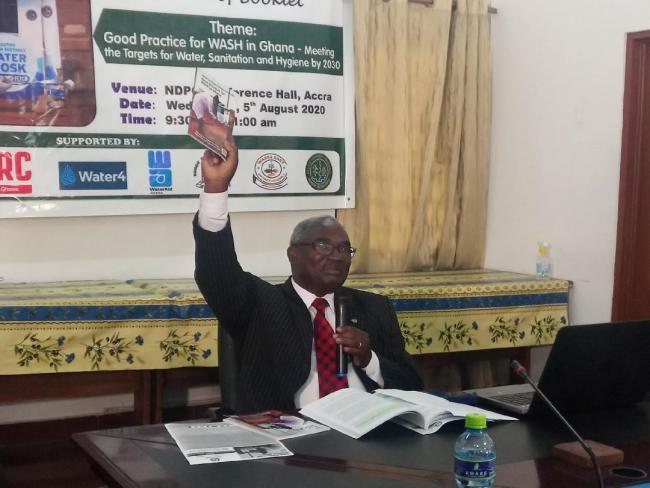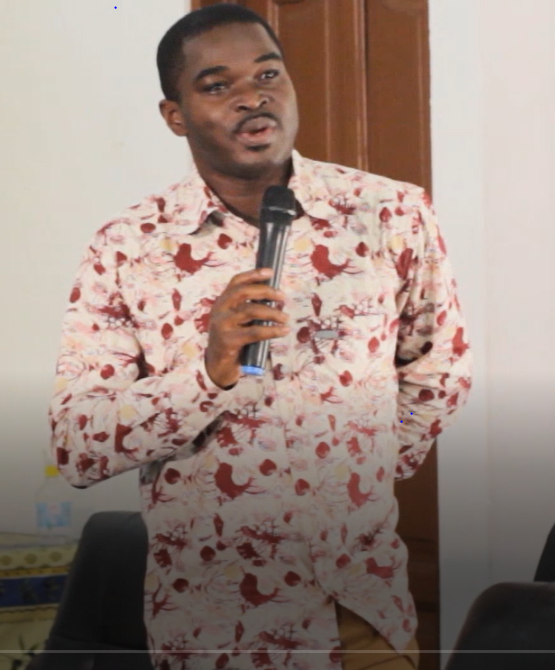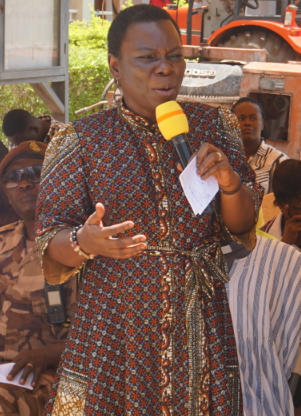Good Practice for WASH booklet to become a reference point for municipal, metropolitan and district chief executives in Ghana.
Published on: 24/08/2020
On Wednesday August 5, 2020 in Accra, the National Development Planning Commission (NDPC) in collaboration with IRC and partners launched a booklet titled Good Practice for WASH in Ghana: Meeting the Targets for Water Sanitation and Hygiene (WASH) Sustainable Development Goals (SDGs). The 57-page booklet was launched with a call on stakeholders to develop robust systems for partnerships, build strong coordination mechanisms with clear roles and responsibilities towards meeting the targets for WASH SDGs.

Dr Kodjo Mensah-Abrampa, Director General of the NDPC launching the booklet (photo A. Wumbei, IRC Ghana)
In his keynote address to launch the booklet, Dr Kodjo Mensah-Abrampa, Director General of the NDPC stated, “What we are launching here today tells us that the challenges we are facing with leadership, coordination, partnership and ownership have been taken up and turned around by the three districts. I now have the conviction that if we are going to make it at the end of the tenth year, at 2030 to attain the SDG for WASH, this booklet will be useful in feeding into the process and also initiating new thoughts, simple thoughts around what has been neglected and bringing it back and expanding it to show to the world that it can be done.”
Dr Mensah-Abrampa promised to be the number one advocate in sharing the stories and will ensure that the booklet eventually becomes a reference point for municipal, metropolitan and district chief executives. He acknowledged IRC's partnership and commended the Country Director and team for thinking through the project with the NDPC, and jointly constituting the documentation team that visited the three districts across Ghana to help in collecting and putting the stories together as key learning points. With a copy of the Good Practice for WASH booklet raised up in his right hand, the Director General declared, "With the able support of IRC, I hereby declare the Good Practice for WASH in Ghana booklet duly launched."

Dr Felix Addo-Yobo, SDG Implementation Coordinating Committee (ICC) Coordinator and Director, Development Policy Division of NDPC (photo A. Wumbei, IRC Ghana)
Dr Felix Addo-Yobo, SDG Implementation Coordinating Committee (ICC) Coordinator and Director, Development Policy Division of NDPC said that the government was committed to achieving access to safe water supply and water related targets of the 2030 Agenda for sustainable development; and that with about 10 years to the 2030 deadline, there was the urgent need to identify innovative actions like the untold stories of Wassa East, Bongo and Asutifi North districts captured in the Good Practice for WASH booklet to fast-track the delivery of the SDGs.
“Today we are launching this booklet and will follow through to disseminate across the Metropolitan Municipal and District Assemblies (MMDAs) and other Ministries, Departments and Agencies (MDAs) across the country to inform replication,” he said, highlighting the take-away messages drawn from the good practice stories:

IRC Ghana Country Director Vida Duti (photo A. Wumbei, IRC Ghana)
Vida Duti, IRC Ghana Country Director stated in her brief statement prior to the launch, that in line with the commitment to support the Government of Ghana in the development of the required systems to drive the delivery of SDGs in Ghana, IRC collaborated with the NDPC to document best practices for the delivery of water and sanitation in Ghana.
She said, “We are excited to be part of this collaboration with NDPC to have these best cases documented and look forward to taking these lessons to the next level of sharing the information and leveraging additional partnerships that can support the scaling up and institutionalisation of these best practices we see.”
Vida commended the three district authorities and their respective partners for the collaboration; the Conrad Hilton Foundation and the Government of the Netherlands for providing the financial resources for the assignment; and IRC consultant, Peter McIntyre, who worked with the joint team of NDPC and IRC Ghana to collect the nice stories compiled in the booklet.
The Country Director pledged IRC’s commitment for further collaborations with NDPC and other sector partners in the quest to advance best practices for WASH in Ghana. “We look forward to greater partnerships in the future, as we work towards providing everyone in Ghana, with water, sanitation and hygiene services forever,” she added.
Addressing the media soon after the launch, Dr Mensah-Abrampa admitted that the lack of documentation of good practices has led to repetition of mistakes of the past and lessons not feeding into policy and accelerating progress towards set targets. “This is what the NDPC and IRC collaboration are seeking to address in the area of WASH. NDPC is responsible for collecting all these practices and lessons and pulling them together and using it to shape policy and advise government on its pursuit,” he stated.
The NDPC Director General said that the lessons from the three (3) pilot districts are significant and the difference this time is that these lessons will feed into the NDPC planning process and will be shared with the relevant institutions and sectors beyond the Ministry of Sanitation and Water Resources and to bring in other district initiatives.
Dr. Mensah-Abrampa further explained, “Obviously you cannot talk about WASH without talking about health, without talking about education, without talking about science and technology. These multi-disciplinary activities require effective coordination, and this is what NDPC has come out to really champion.”
He stated that the NDPC will deepen the use of the documented lessons - “the key example is the WASH master planning process where relevant actors are brought together like the case of Asutifi North, in pursuit of district WASH full coverage. NDPC will deepen this lesson in the next Medium-Term Development framework and will be part of the guidelines for planning in the districts. These lessons will go far in improving not just the WASH sector but other sectors, using the master plan as point of convergence.”
Due to the COVID-19 health pandemic the launch event had about 25 stakeholders at the face-to-face session with over 30 local and international online participants drawn from MMDAs, MDAs, CSOs, private sector and the media who covered the event - UTV, Ghana News Agency. Participants were encouraged to obtain copies of the Good Practice for WASH booklet and more stories on the innovative WASH approaches and interventions at the NDPC and IRC websites.